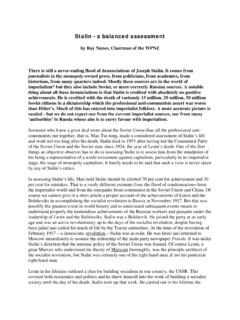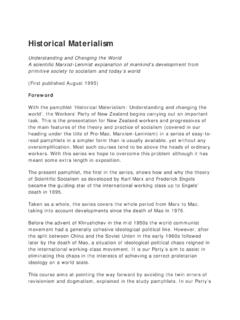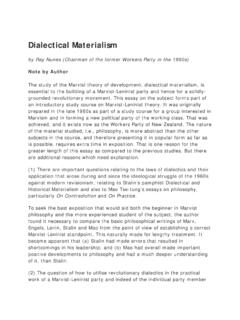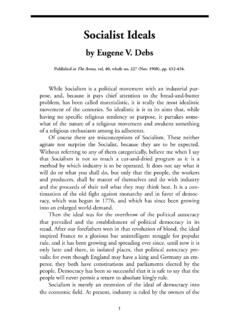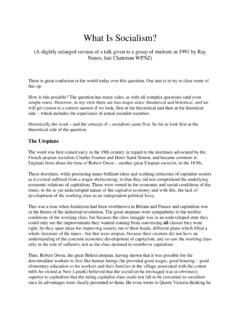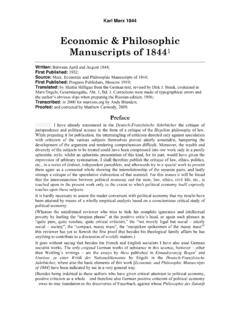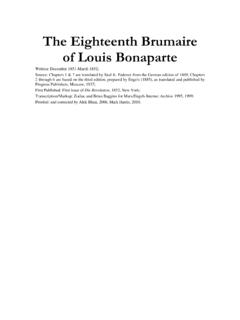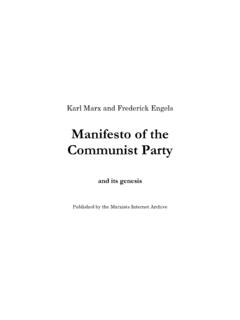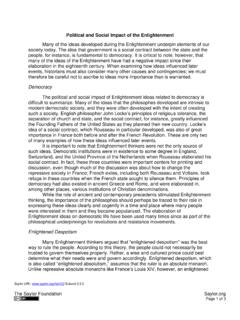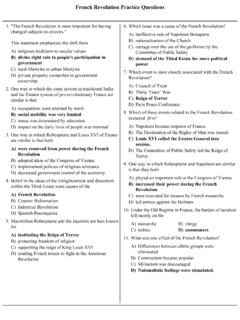Transcription of What is to be Done? - Marxists
1 what is to be Done? Vladimir Lenin1902 ContentsNotes on the TextiPrefaceii1 DOGMATISM AND FREEDOM OF DOES FREEDOM OF CRITICISM MEAN? .. NEW ADVOCATES OF FREEDOM OF CRITICISM .. IN RUSSIA .. ON THE IMPORTANCE OF THE THEORETICAL STRUGGLE 112 THE SPONTANEITY OF THE MASSES AND THE CONSCIOUSNESS OFTHE BEGINNING OF THE SPONTANEOUS UPSURGE .. TO MYSL.. SELF-EMANCIPATION GROUP ANDRABOCHEYE DYELO.. 253 TRADE-UNIONIST POLITICS AND SOCIAL-DEMOCRATIC AGITATION AND ITS RESTRICTION BY THE ECONOMISTS MARTYNOV RENDERED PLEKHANOV MORE PROFOUND .. EXPOSURES AND TRAINING IN REVOLUTIONARYACTIVITY .. IS THERE IN COMMON BETWEEN ECONOMISM AND TER-RORISM? .. WORKING CLASS AS VANGUARD FIGHTER FOR DEMOCRACY MORE SLANDERERS , ONCE MORE MYSTIFIERS .. 584 THE PRIMITIVENESS OF THE ECONOMISTS AND THE ORGANIZA-TION OF THE IS PRIMITIVENESS?
2 AND ECONOMISM .. OF WORKERS AND ORGANISATION OF REVO-LUTIONARIES .. SCOPE OF ORGANISATIONAL WORK .. CONSPIRATORIAL ORGANISATION AND DEMOCRATISM .. AND ALL-RUSSIA WORK .. 915 THE PLAN FOR AN ALL-RUSSIA POLITICAL WAS OFFENDED BY THE ARTICLE WHERE TO BEGIN .. A NEWSPAPER BE A COLLECTIVE ORGANISER? .. TYPE OF ORGANISATION DO WE REQUIRE? .. 110 Endnotes1154 CONTENTSN otes on the TextWhat is to be Done? Vladimir LeninFirst published:1902 Transcription by:Tim DelaneyThis printable edition produced by:Chris Russell for the Marxists Internet ArchivePlease note:The text may make reference to page numberswithinthis document. Thesepage numbers were maintained during the transcription process to remain faithful to theoriginal editionandnotthis version and, therefore, are likely to be inaccurate.
3 This statementapplies only to the text itself and not any indices or tables of contents which have beenreproduced for this s key work on Party objectives and organization. Lenin argues that while capitalismpredisposes the workers to the acceptance of socialism it does not spontaneously makethem conscious Socialists. The proletariat of its own can achieve only trade-union con-sciousness. Accordingly, it was necessary to institute a party of a new type capable ofimbuing the working-class with revolutionary consciousness. This is the origin of Lenin sfamous theory of the Party as vanguard of the proletariat . He conceived of the vanguardas a highly centralized body organized around a core of experienced professional revolu-tionaries. Only such a party could succeed in the conditions of illegality prevailing in tsaristRussia at the time.
4 The book also contains an attack on to the author s original plan, the present pamphlet was to have been devoted toa detailed development of the ideas expressed in the article Where To Begin , (Iskra, , May 1901).1We must first apologise to the reader for the delay in fulfilling the promisemade in that article (and repeated in response to many private inquiries and letters). Oneof the reasons for this delay was the attempt, undertaken in June of the past year (1901), tounite all the Social-Democratic organisations abroad. It was natural to wait for the resultsof this attempt, for, had the effort proved successful, it would perhaps have been necessaryto expoundIskra sconceptions of organisation from a somewhat different approach; in anycase, such a success promised to put an end very quickly to the existence of the two trendsin the Russian Social-Democratic movement.
5 As the reader knows, the attempt failed, and,as we propose to show, was bound to fail after the new swing, ofRabocheye Dyelo,inits issue No. 10, towards Economism. It was found to be absolutely essential to begin adetermined struggle against this trend, diffuse and ill-defined, but for that reason the morepersistent, the more capable of reasserting itself in diverse forms. Accordingly, the originalplan of the pamphlet was altered and considerably main theme was to have been the three questions raised in the article Where ToBegin the character and main content of our political agitation; our organisational tasks;and the plan for building, simultaneously and from various sides, a militant, all-Russiaorganisation. These questions have long engaged the mind of the author, who tried to raisethem inRabochaya Gazetaduring one of the unsuccessful attempts to revive that paper (seeChapter V).
6 But the original plan to confine the pamphlet to an analysis of only these threequestions and to set forth our views as far as possible in a positive form, without, or almostwithout, entering into polemics, proved wholly impracticable, for two reasons. On the onehand, Economism proved to be much more tenacious than we had supposed (we employ theterm Economism in the broad sense, as explained inIskra,No. 12 (December 1901), in thearticle entitled A Talk With Defenders of Economism , which was a synopsis, so to speak,of the present pamphlet2). It became clear beyond doubt that the differences regarding thesolution of the three questions mentioned were explainable to a far greater degree by theiiiiiPrefacebasic antithesis between the two trends in the Russian Social-Democratic movement thanby differences over details.
7 On the other hand, the perplexity of the Economists over thepractical application of our views inIskraclearly revealed that we often speak literally indifferent tongues and thereforecannotarrive at an understanding without beginningab ovo,and that an attempt must be made, in the simplest possible style, illustrated by numerousand concrete examples,systematically to clarify allour basic points of difference withallthe Economists. I resolved to make such an attempt at clarification , fully realisingthat it would greatly increase the size of the pamphlet and delay its publication; I sawnoother wayof meeting my pledge I had made in the article Where To Begin . Thus, tothe apologies for the delay, I must add others for the serious literary shortcomings of thepamphlet. I had to workin great haste,with frequent interruptions by a variety of examination of the above three questions still constitutes the main theme of thispamphlet, but I found it necessary to begin with two questions of a more general nature why such an innocent and natural slogan as freedom of criticism should be for us averitable war-cry, and why we cannot come to an understanding even on the fundamentalquestion of the role of Social-Democrats in relation to the spontaneous mass , the exposition of our views on the character and substance of political agitationdeveloped into an explanation of the difference between trade-unionist politics and Social-Democratic politics.
8 While the exposition of our views on organisational tasks developedinto an explanation of the difference between the amateurish methods which satisfy theEconomists, and the organisation of revolutionaries which we hold to be , I advance the plan for an all-Russia political newspaper with all the more insis-tence because the objections raised against it are untenable, and because no real answer hasbeen given to the question I raised in the article Where To Begin as to how we can setto work from all sides simultaneously to create the organisation we need. Finally, in theconcluding part, I hope to show that we did all we could to prevent a decisive break with theEconomists, a break which nevertheless proved inevitable; thatRabocheye Dyeloacquireda special significance, a historical significance, if you will, because it expressed fully andstrikingly, not consistent Economism, but the confusion and vacillation which constitutethe distinguishing feature ofan entire periodin the history of Russian Social-Democracy;and that therefore the polemic withRabocheye Dyelo,which may upon first view seemexcessively detailed, also acquires significance, for we can make no progress until we havecompletely put an end to this LeninFebruary 1902ivPrefaceCHAPTER 1 DOGMATISM AND FREEDOM what DOES FREEDOM OF CRITICISM MEAN?
9 Freedom of criticism is undoubtedly the most fashionable slogan at the present time, andthe one most frequently employed in the controversies between socialists and democratsin all countries. At first sight, nothing would appear to be more strange than the solemnappeals to freedom of criticism made by one of the parties to the dispute. Have voices beenraised in the advanced parties against the constitutional law of the majority of Europeancountries which guarantees freedom to science and scientific investigation? Somethingmust be wrong here, will be the comment of the onlooker who has heard this fashionableslogan repeated at every turn but has not yet penetrated the essence of the disagreementamong the disputants; evidently this slogan is one of the conventional phrases which, likenicknames, become legitimised by use, and become almost generic terms.
10 In fact, it is no secret for anyone that two trends have taken form in present-day international3 Social-Democracy. The conflict between these trends now flares up in a bright flame andnow dies down and smoulders under the ashes of imposing truce resolutions . The essenceof the new trend, which adopts a critical attitude towards obsolete dogmatic Marx-ism, has been clearly enoughpresentedby Bernstein anddemonstratedby must change from a party of social revolution into a democratic partyof social reforms. Bernstein has surrounded this political demand with a whole battery ofwell-attuned new arguments and reasonings. Denied was the possibility of putting so-cialism on a scientific basis and of demonstrating its necessity and inevitability from thepoint of view of the materialist conception of history.

